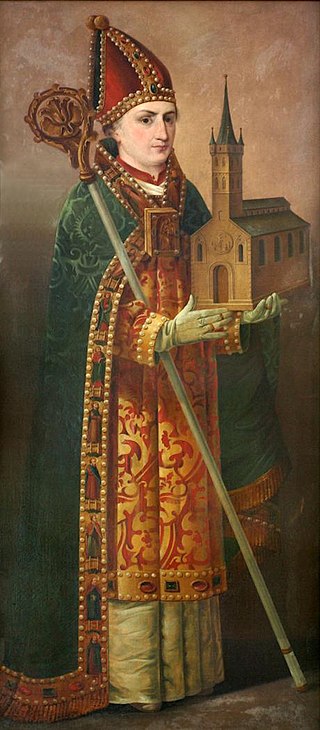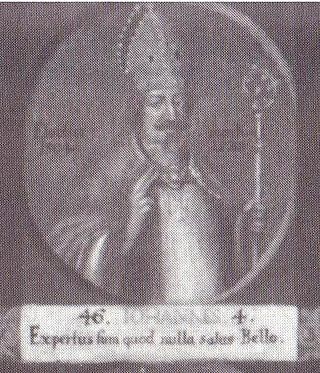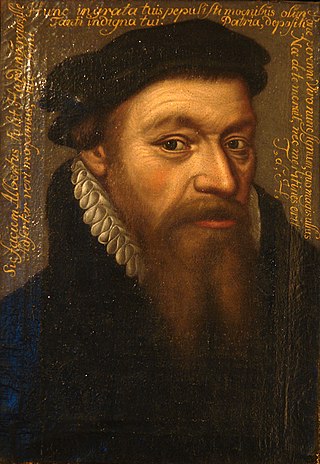Saint Adalgar | |
|---|---|
| Archbishop of Bremen | |
| Died | 9 May 909 Bremen |
| Venerated in | Roman Catholic Church, Eastern Orthodox Church |
| Feast | 29 April |
Adalgar (died 9 May 909), venerated as Saint Adalgar, was the third archbishop of Bremen from 888 until his death. Adalgar is revered as a saint in the Roman Catholic and Eastern Orthodox Churches. His feast day is 29 April. [1]
When Rimbert was appointed in 865 to succeed Ansgar, the first archbishop of Hamburg, the abbot of the Benedictine abbey of Corvey gave him his brother, Adalgar, as a companion. [2] The young Adalgar was then a deacon. Toward the end of Rimbert's life, he was consecrated bishop to assist the latter; and he succeeded him in the archbishopric on 11 June 888. During the latter half of his twenty years’ rule, age and infirmity made it necessary for him also to have a coadjutor in the person of Hoger, another monk of Corvey; and later five neighboring bishops were charged to assist the archbishop in his metropolitan duties.
Adalgar lived in troublous times. Although Arnulf's victory over the Normans (891) was a relief to his diocese, and although under Louis the Child (900-911) it suffered less from Hungarian onslaughts than the districts to the south and east of it, yet the general confusion restricted Adalgar's activity, and he was able to do very little in the northern kingdoms which were supposed to be part of his mission. There were also new contests over the relation of Bremen to the archiepiscopal see of Cologne.
Bremen had originally been under the jurisdiction of Cologne; but this relation was dissolved on the reestablishment of the archbishopric of Hamburg in 848; and Pope Nicholas I had confirmed the subordination of Bremen to Hamburg in 864. In 890 Archbishop Hermann of Cologne wrote to Pope Stephen V, demanding that the archbishop of Hamburg, as bishop of Bremen be subject to him.
The course of the controversy is somewhat obscure; but it is known that Stephen cited both contestants to Rome, and when Adalgar alone appeared, Hermann being represented by delegates with unsatisfactory credentials, the pope referred the matter to Archbishop Fulk of Reims, to decide in a synod at Worms. [3] In the meantime, Stephen died; and his successor Formosus placed the investigation in the hands of a synod which met at Frankfurt in 892 under Hatto of Mainz. On the basis of its report, Formosus decided that Bremen should be united to Hamburg so long as the latter had no suffragan sees, but should revert to Cologne when any were erected, the archbishop of Hamburg meanwhile taking part in the provincial synods of Cologne, without thereby admitting his subordination.
Little is known of Adalgar's personality. From the way in which Rimbert's biographer and Adam of Bremen speak of him, he seems to have been a man of some force, but perhaps not strong enough for the difficult times in which his activity was cast.

Ansgar, also known as Anskar, Saint Ansgar, Saint Anschar or Oscar, was Archbishop of Hamburg-Bremen in the northern part of the Kingdom of the East Franks. Ansgar became known as the "Apostle of the North" because of his travels and the See of Hamburg received the missionary mandate to bring Christianity to Northern Europe.
Pope Felix III was the bishop of Rome from 13 March 483 to his death. His repudiation of the Henotikon is considered the beginning of the Acacian schism. He is commemorated on March 1.
Saint Rimbert was archbishop of Hamburg-Bremen, in the northern part of the Kingdom of East Frankia from 865 until his death in 888. He most famously wrote the hagiography about the life Ansgar, the Vita Ansgari, one of the most popular hagiographies of middle ages.
The Vita Ansgarii, also known as the Vita Anskarii, is the hagiography of saint Ansgar, written by Rimbert, his successor as archbishop in the Prince-Archbishopric of Bremen. The Vita is an important source not only in detailing Ansgar's Scandinavian missionary work, but also in its descriptions of the everyday lives of people during the Viking Age.

Hincmar, archbishop of Reims, was a Frankish jurist and theologian, as well as the friend, advisor and propagandist of Charles the Bald. He belonged to a noble family of northern Francia.

Albert Suerbeer was the first Archbishop of Riga in Livonia.
The von Hurter family belonged to the Swiss nobility; in the eighteenth and nineteenth centuries three of them were known for their conversions to Roman Catholicism, their ecclesiastical careers in Austria and their theological writings.

Arbeoof Freising was an early medieval author and the Bishop of Freising from 764.

Vicelinus was a German bishop of Oldenburg in Holstein who was considered the apostle of Holstein. Also known as – Apostle of Obodriten, of the Wends, Vicelinus, Vincelin, Vizelin, Wissel, Witzel.
Siegfried I was the Abbot of Fulda from 25 December 1058 until 6 January 1060, and from January 1060 until his death in February 1084, he was Archbishop of Mainz.

Saint Irmgardis, Saint Irmgard of Süchteln was a medieval saint and sovereign Countess Irmgardis of Aspel (Germany) in 1013–1085. Her relics are preserved in sarcophagus in the altar of Cologne Cathedral.
Peter Joseph Elvenich was a German Catholic theologian and philosopher born in Embken, a village that today is part of Nideggen, North Rhine-Westphalia. He was a principal supporter and defender of Hermesianism, a theological belief system based on the teachings of Georg Hermes (1775–1831).

Leopold Anton Eleutherius Freiherr von Firmian was Bishop of Lavant 1718–24, Bishop of Seckau 1724–27 and Prince-Archbishop of Salzburg from 1727 until his death.

John IV of Saxe-Lauenburg was a Prince-Bishop of Hildesheim.

Michael Buchberger was a Roman Catholic priest, notable as the seventy-fourth bishop of Regensburg since the diocese's foundation in 739.
Saint Sturm, also called Sturmius or Sturmi, was a disciple of Saint Boniface and founder and first abbot of the Benedictine monastery and abbey of Fulda in 742 or 744. Sturm's tenure as abbot lasted from 747 until 779.

Albert Hardenberg or Albertus Risaeus was a Reformed theologian and Protestant reformer, who was also active as a reformer in Cologne, Bremen and Emden.

Ingenuinus or Ingenuin, also Jenewein, was the second historically confirmed bishop of Sabiona or Säben. He is venerated as a saint.
Erhard Bodenschatz was a German pastor, cantor and composer. He was cantor at Schulpforta from 1600 to 1603 and pastor in Groß-Osterhausen/Querfurt from 1608 onwards.

Sigismund Anton Graf von Hohenwart, S.J. was from 1791 to 1794 Bishop of Trieste, from 1794 to 1803 Bishop of St. Pölten, and from 1803 to 1820 he was Prince-Archbishop of Vienna.